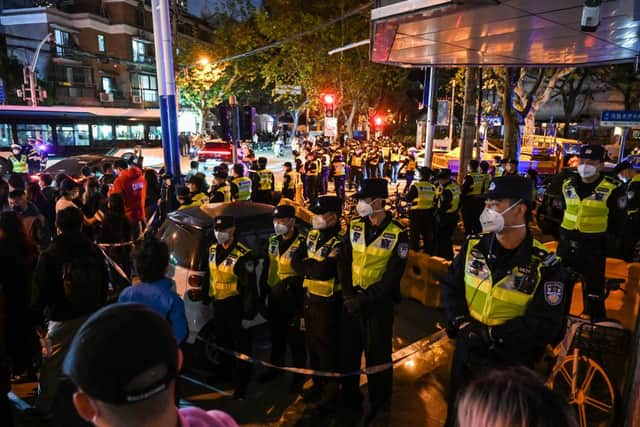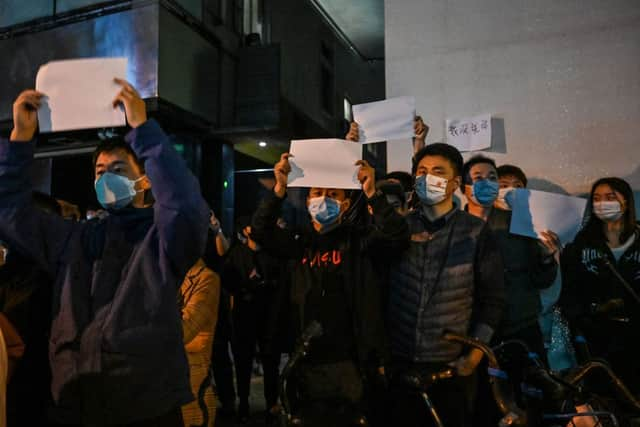Edward Lawrence: what happened to BBC journalist in China during Covid protests - why was he arrested?
and live on Freeview channel 276
A BBC journalist was “beaten and kicked by police” before being arrested during protests over Covid measures in China, the broadcaster has said.
Edward Lawrence, a cameraman for the BBC, was arrested in Shanghai on Sunday (27 November) while at the scene of protests, which have now erupted across China against the ruling Communist Party in anger over the country’s zero-Covid policy.
Advertisement
Hide AdAdvertisement
Hide AdThe strategy aims to isolate every person infected with coronavirus and has helped to keep China’s case numbers lower than many major countries, including the United States. However, the policy has meant that people in some areas have been confined to their homes for up to four months with a lack of reliable food supplies.
The ruling party promised last month to reduce the disruption of zero-Covid by changing quarantine and other rules, but public acceptance is wearing thin after a spike in infections prompted cities to tighten controls, fuelling complaints that overzealous enforcement is hurting the public.
Protests have spread to at least eight major cities after at least 10 people died on Thursday (24 November) in a fire in an apartment building in Urumqi in the north-western region of Xinjiang. The deadly fire prompted angry questions online about whether firefighters or victims trying to escape were blocked by locked doors or other anti-virus controls. Most protesters complained about excessive restrictions, but some shouted slogans against Mr Xi, China’s most powerful leader since at least the 1980s.
Anti-virus measures have been eased in some scattered areas, including Urumqi and the city of Korla in Xinjiang. Urumqi and Korla announced that markets and other businesses in areas deemed at low risk of infection will reopen this week and public bus services will resume in what appears to be an attempt to mollify the public. However, there has been no indication as to whether residents in higher-risk areas will be allowed out of their homes.


What happened to Edward Lawrence?
Advertisement
Hide AdAdvertisement
Hide AdThe BBC said Mr Lawrence was “attacked” and “beaten by police” in Shanghai during the protests on Sunday night.
The broadcaster said it was “very concerned” after the cameraman was “arrested and handcuffed” while covering the demonstrations over China’s Covid restrictions. Some footage on social media showed him being dragged to the ground in handcuffs, while he was seen saying in another video: “Call the consulate now”.
A BBC spokesperson said: “The BBC is extremely concerned about the treatment of our journalist Ed Lawrence, who was arrested and handcuffed while covering the protests in Shanghai.
“He was held for several hours before being released. During his arrest he was beaten and kicked by police. This happened while he was working as an accredited journalist. It is very worrying that one of our journalists was attacked in this way whilst carrying out his duties.”


Advertisement
Hide AdAdvertisement
Hide AdThe BBC claimed it had no official explanation or apology from Chinese authorities, adding that officials said Mr Lawrence was arrested “for his own good” in case he caught Covid from the crowd. The corporation added: “We do not consider this a credible explanation.”
Mr Lawrence later tweeted: “I understand at least one local national was arrested after trying to stop the police from beating me.”
Since Friday, people have been staging protests across China, where street demonstrations are extremely rare, over the country’s draconian zero-Covid policy. Mr Lawrence has been in contact with the Foreign, Commonwealth and Development Office (FCDO) over the matter.
What has the UK government said?
Downing Street has condemned the arrest of Mr Lawrence as “shocking and unacceptable”, and warned Beijing there is “absolutely no excuse” for reporters to be “beaten by the police” .
Advertisement
Hide AdAdvertisement
Hide AdForeign Secretary James Cleverly on Monday described the incident as “deeply disturbing”, while No 10 said journalists “must be able to do their jobs without fear of intimidation”.
Downing Street also urged the Chinese authorities to “respect those who decide to express their views about the current situation”, as citizens take to the streets to oppose the country’s draconian zero-Covid policy. The government added that it would not seek to “conflate” its stance on the right to protest with its intention to build “constructive relationships” with China on other issues.
The PM’s spokesman said: “The arrest of this journalist who was simply going about their work is shocking and unacceptable. Journalists must be able to do their jobs without fear of intimidation.”
Earlier, Foreign Secretary James Cleverly on Monday described the incident as “deeply disturbing”, while Business Secretary Grant Shapps said there can be “absolutely no excuse whatsoever” for a reporter covering the protests in China to be “beaten by the police”.
Advertisement
Hide AdAdvertisement
Hide AdMr Shapps told Sky News: “There can be absolutely no excuse whatsoever for journalists who are simply covering the process going on, for being beaten by the police. I know that’s (of) considerable concern.”
The Business Secretary also told LBC radio that “freedom of press and freedom to report should be sacrosanct”, adding that it was “unacceptable” for journalists to be “caught up and involved and indeed arrested” when they should be “fully entitled to cover things freely”.
Mr Cleverly said in a Tweet: “Media freedom and freedom to protest must be respected. No country is exempt. The arrest of BBC journalist @EP_Lawrence China is deeply disturbing. Journalists must be able to do their job without intimidation.”
Security minister Tom Tugendhat warned the arrest was “an echo of the repression the CCP (Chinese Communist Party) is attempting elsewhere”, writing on Twitter: “China’s attempts at state repression here in the UK remind us of the urgent need to defend our own freedoms.”
Advertisement
Hide AdAdvertisement
Hide AdIt was reported that China’s foreign ministry contested the BBC statement, claiming Mr Lawrence did not identify himself as a journalist. Ministry spokesman Zhao Lijian reportedly said the BBC’s account did not reflect what had happened.
Comment Guidelines
National World encourages reader discussion on our stories. User feedback, insights and back-and-forth exchanges add a rich layer of context to reporting. Please review our Community Guidelines before commenting.
